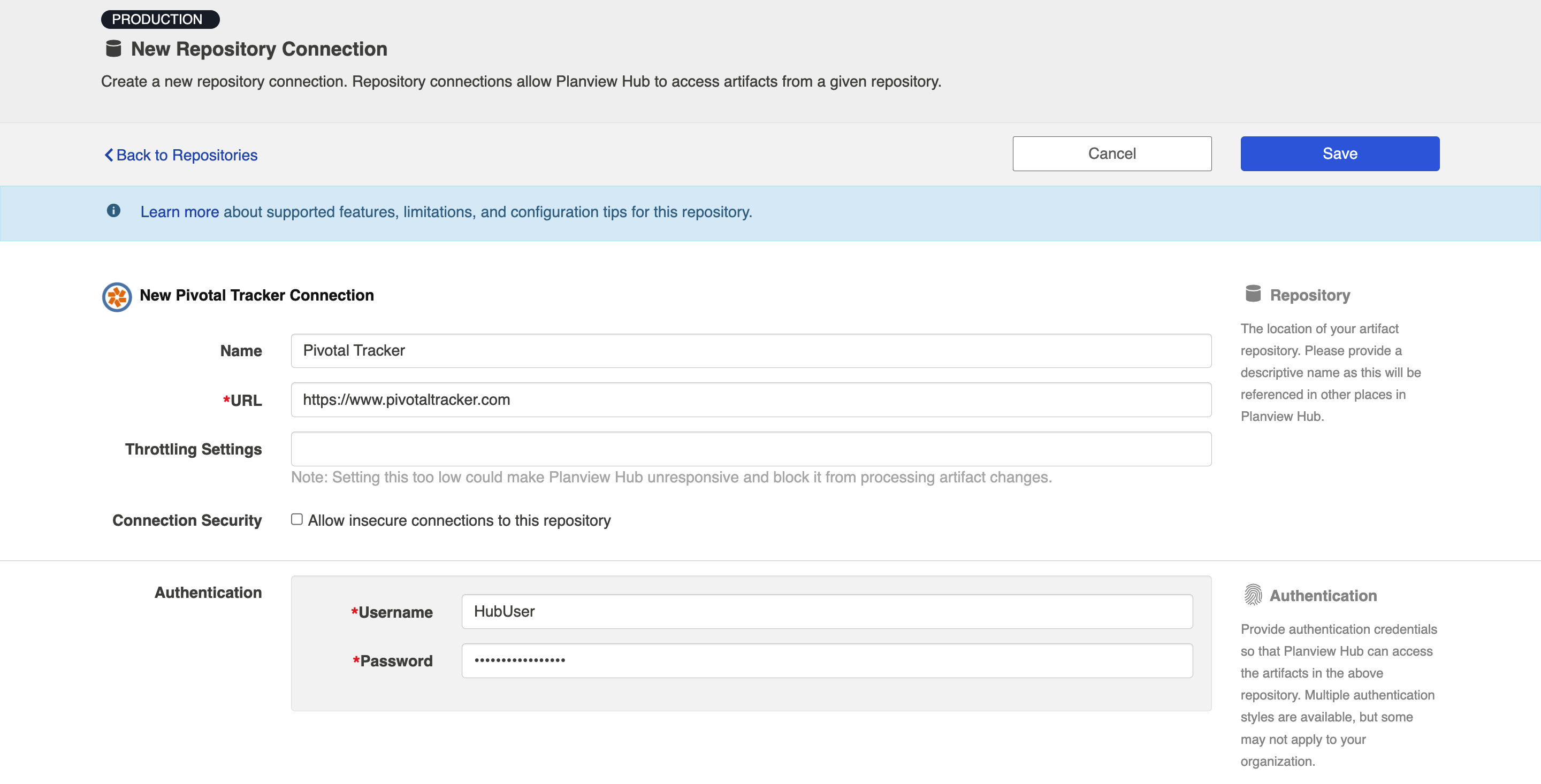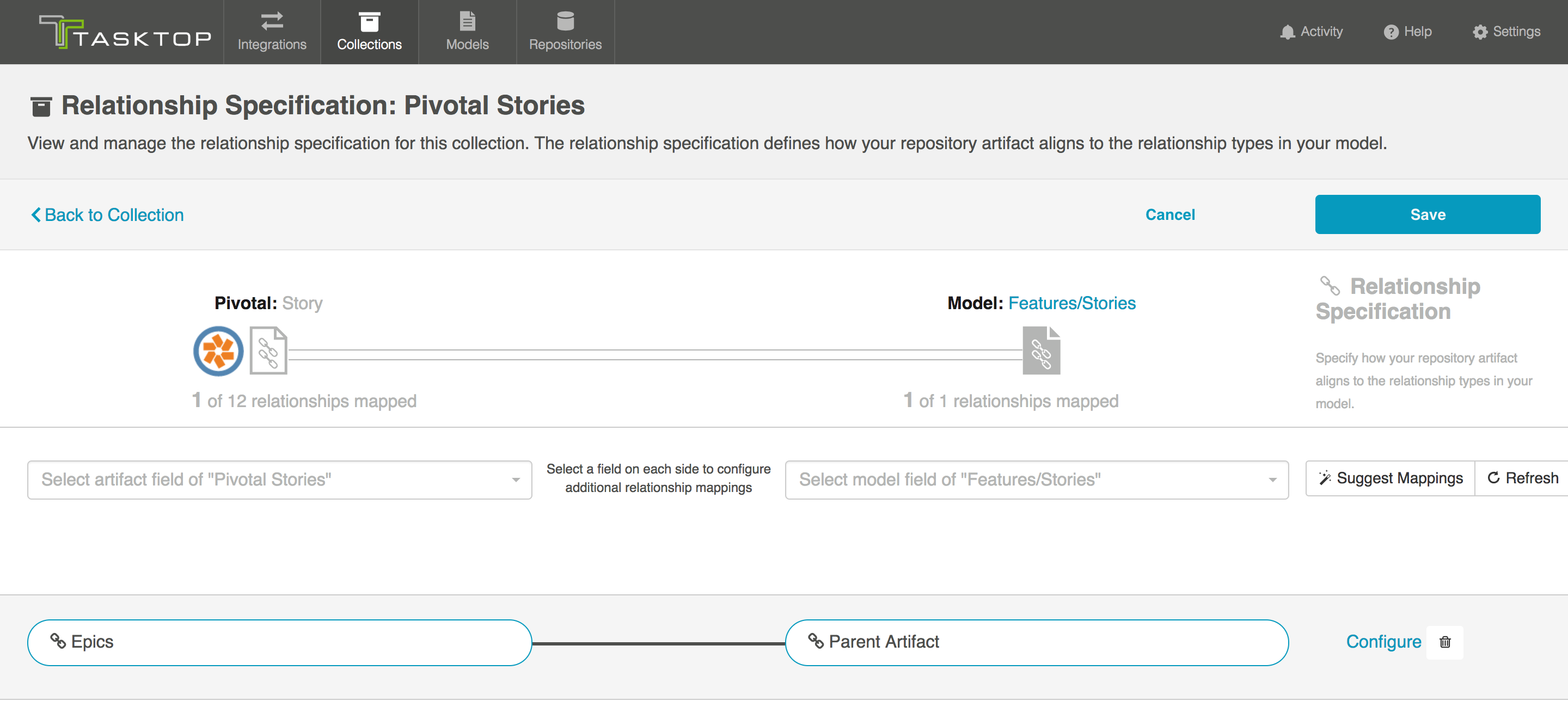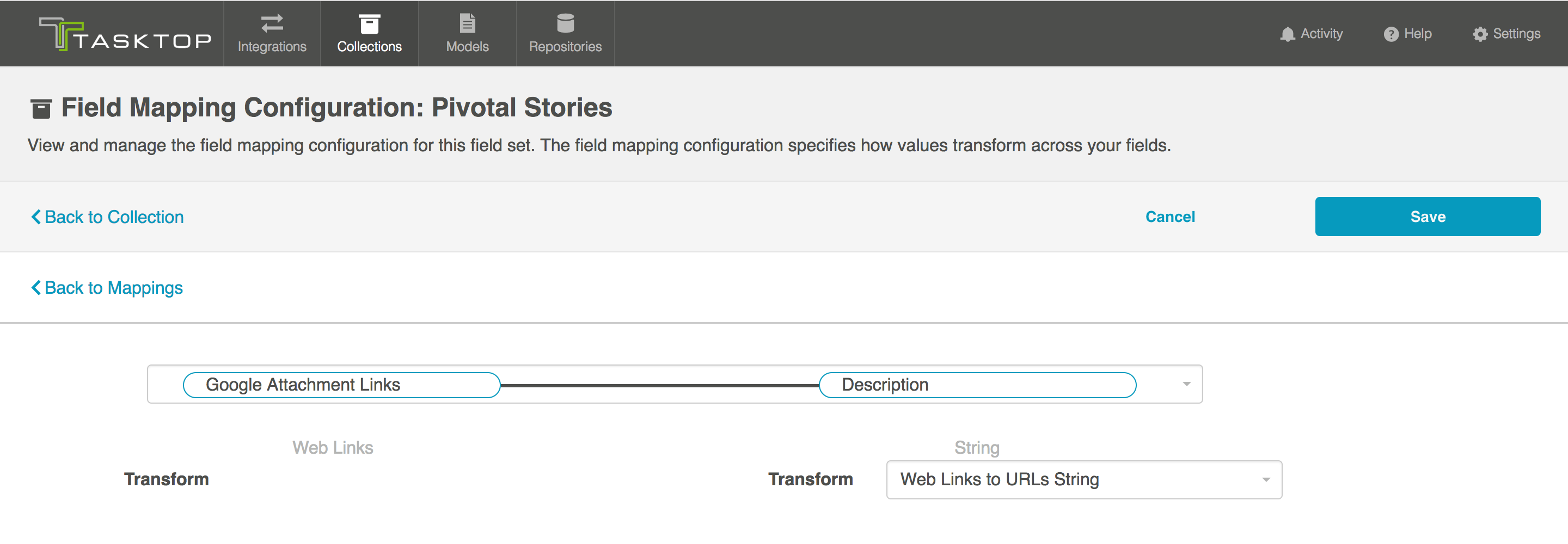Pivotal Tracker
- Last updated
- Dec 4, 2023
- Save as PDF
- Getting Started
- Installation Primer
- Quick Start Guide
- Key Concepts
- Step 1: Connect to Your Repository
- Step 2: Create or Reuse a Model
- Step 3: Create Your Collection(s)
- Step 4: Configure your Integration
- Step 5: Expand or Modify your Integration
- Configure your Hub to Hub Integration
- Troubleshooting
- Settings
- FAQs
- General
- Tasktop Joins Planview FAQ
- Deprecation of NTLM FAQ
- Does Hub need to be restarted when configuration changes are made?
- Does Hub support artifact deletion across repositories?
- Does Hub support the use of port forwarding/reverse proxies?
- How are users counted in Hub?
- How can I find User Guides for previous versions of Planview Hub?
- How can I learn what transforms are available?
- How does Hub's built-in person reconciliation algorithm work?
- How does Hub change detection work?
- How does Hub determine that a field in project 1 is the same field as in project 2?
- How does Hub handle field values with the same label?
- How does Hub scale to meet Enterprise needs?
- How does Planview ensure security of customer information?
- How do I automate internal workflows using Hub's public API?
- How do I ensure business continuity?
- If a conflict occurs on one mapped field on an artifact, do we synchronize the remaining fields that aren’t in conflict or does that one conflict block the rest of the fields from synchronizing?
- If Comment Flow (or Attachment Flow) is enabled, will only newly added comments (or attachments) sync over?
- If I click 'Process All Artifacts,' what exactly will process?
- What's Different in User Management Workflow with Keycloak Since Hub Version 24.4?
- What's the difference between Continuous Delivery and Long Term Support?
- What are Smart Fields?
- What are the differences between Time Interval and Cron Expression?
- What can I do to lessen the performance impact on my external repositories?
- What does "allow unmapped values to flow" mean for a single select or multi select field?
- What does 'back synchronization' mean?
- What does making a model field "required" mean?
- What does the Hub deployment process look like?
- What do the "special features" mean?
- What is a Concurrency Limit? How does it differ from the Integration Maximum Concurrency Limit?
- What is Planview Hub's underlying architecture?
- What is the difference between 'Process All Artifacts' and 'Initiate Synchronization'?
- When will Planview add or remove support for a repository version?
- Where can I learn about specific connectors like Jira, Jama, etc?
- Why shouldn't I change artifact type in my repository after an artifact has synchronized?
- Installation and Maintenance
- After upgrade, will my integrations automatically resume running?
- Does Planview Hub support Docker? (need to update)
- How can I improve REST API traffic to a repository by using a load balancer?
- How can I increase Hub's session time-out?
- How can I override the default socket timeout for my operational database?
- How can I run Hub on port 443 (the standard SSL port) when I don’t have super user (root) permissions?
- How do I configure Entra managed accounts with Azure SQL in Hub?
- How do I configure Hub to Hub client access?
- How do I configure Hub to use HTTPS?
- How do I configure the max days I'd like to keep Hub log files?
- How do I configure the PlanviewLinkBridgeUser role?
- How do I configure which port Hub uses?
- How do I import my license key into Hub?
- How do I migrate my Hub configuration between databases?
- How do I migrate my operational database from MySQL to PostgreSQL?
- How do I move my Hub Instance to a new server?
- How do I only keep the last two weeks of Tomcat logs?
- How do I prevent vulnerabilities in Windows OS?
- How do I set up Hub to run as a service on Linux?
- How do I upgrade Hub?
- If I forget my master password, how can I remove or change it?
- I’ve forgotten my password to the User Administration Console (Keycloak). How do I get back in?
- What is the Secure Password Storage Security Level and Master Password?
- What practices can I take to reduce "open redirect" security vulnerabilities?
- What should I be aware of when upgrading to 19.2?
- What should I be aware of when upgrading to 19.3?
- What should I be aware of when upgrading to 19.4?
- What should I be aware of when upgrading to 21.1?
- What should I be aware of when upgrading to 23.4?
- Where are the program files, configuration files, and logs for Hub located?
- Where is the context stored for Hub and Keycloak? How can I setup a “persistent volume claim” so that I don’t lose that context when either the Keycloak container or Hub container are restarted?
- Why am I unable to access Hub after bookmarking the login page?
- Troubleshooting
- How can I resolve a "too many files open" error?
- How can I resolve a 'certificate error' in my browser?
- How can I resolve a 'GC overhead limit exceeded (CCRRTT-30000E)' error?
- How do I change Hub's logging configuration?
- How do I troubleshoot in Hub?
- How often and in which interval does Hub retry errors?
- If I delete a previously synchronized artifact in one of my repositories and do not want it to be recreated, is there any way to 'blacklist' it in Hub?
- Log reads “Failed to acquire database lease. The database is in use by another instance of Hub.” What has happened?
- My log files are too big! How can I compress them to save space?
- Where can I find details on errors in Hub?
- Where can I find Hub logs?
- Why am I seeing errors for artifacts that don't even meet my artifact filtering criteria?
- Why do I get a timezone error when creating a database connection?
- Enterprise Data Stream
- Gateway
- Hub on Cloud
- How can I connect Hub Cloud to an On-prem repository?
- How can I resolve certificate validation errors?
- How do I import a CA certificate into my Hub Cloud instance?
- I'm getting a 403 error when I try to log in to my Cloud instance. What should I do?
- Planview Hub Cloud Migration FAQ
- Planview Hub Cloud Security FAQ
- What are the feature differences between Hub Cloud and Hub On-prem?
- What is Hub Cloud's underlying architecture?
- When is my Cloud instance upgraded?
- Connectors
- Can I write information to the Jira sprint field?
- Do I need to perform additional steps for TFS upon upgrading?
- How can I reduce the number of projects shown for Clarity in Hub?
- How can I resolve an error stating, 'Received fatal alert: handshake_failure'?
- How do I create a repository connection to Atlassian Jira On Demand with SSO enabled?
- How do I resolve the 'Too many persons found' error upon integrating with a Jira cloud instance?
- If the PTC Windchill RVS server is localized (i.e., installed on a non-English locale OS), will related objects also need to be localized?
- I received the exception 'PKIX path building failed ... unable to find valid certification path to requested target' when connecting to Team Foundation Server. How do I fix it?
- Jira Epic/Parent Link FAQ
- Jira GDPR Changes
- What happens if the Timesheet Hours per Day field does not match the timesheet configuration?
- Why are there so many files in my temp directory when I use the connector?
- Why do I get authentication errors for ALM/QC when I've correctly entered my credentials?
- Why do I get the error message 'Error while parsing file … expecting Index' while integrating with IBM DOORS?
- Why do I see an error stating 'This method is no longer supported by the catalog service' when querying Visual Studio Online (VSO) or Azure DevOps Services?
- General
- Planview Hub Product Releases
- 25.2 Release Notes
- Hub Release Notes - 25.2.0.20250203-b8396
- Hub Release Notes - 25.2.0.20250306-b8562
- Hub Release Notes - 25.2.0.20250309-b8583
- Hub Release Notes - 25.2.0.20250315-b8615
- Hub Release Notes - 25.2.0.20250323-b8658
- Hub Release Notes - 25.2.0.20250402-b8712
- Hub Release Notes - 25.2.0.20250408-b8745
- Hub Release Notes - 25.2.0.20250417-b8793
- Hub Release Notes - 25.2.0.20250423-b8823
- Hub Release Notes - 25.2.0.20250428-b8844
- Hub Release Notes - 25.3.0.20250430-b8864
- Hub Release Notes - 25.3.0.20250505-b8879
- 25.1 Release Notes
- Hub Release Notes - 25.1.0.20241126-b8029
- Hub Release Notes - 25.1.0.20241203-b8066
- Hub Release Notes - 25.1.0.20241211-b8109
- Hub Release Notes - 25.1.0.20241230-b8207
- Hub Release Notes - 25.1.0.20250113-b8289
- Hub Release Notes - 25.1.2
- Hub Release Notes - 25.1.3
- Hub Release Notes - 25.1.4
- Hub Release Notes - 25.1.5
- Hub Release Notes - 25.1.6
- Hub Release Notes - 25.1.7
- 24.4 Release Notes
- Hub Release Notes - 24.4.0.20240820-b7489
- Hub Release Notes - 24.4.0.20240829-b7547
- Hub Release Notes - 24.4.0.20240901-b7567
- Hub Release Notes - 24.4.0.20241002-b7743
- Hub Release Notes - 24.4.0.20241015-b7814
- Hub Release Notes - 24.4.0.20241024-b7863
- Hub Release Notes - 24.4.0.20241104-b7916
- Hub Release Notes - 24.4.10
- Hub Release Notes - 24.4.2
- Hub Release Notes - 24.4.3
- Hub Release Notes - 24.4.4
- Hub Release Notes - 24.4.5
- Hub Release Notes - 24.4.6
- Hub Release Notes - 24.4.7
- Hub Release Notes - 24.4.8
- Hub Release Notes - 24.4.9
- 24.3 Release Notes
- Hub Release Notes - 24.3.0.20240504-b6925
- Hub Release Notes - 24.3.0.20240602-b7072
- Hub Release Notes - 24.3.0.20240607-b7098
- Hub Release Notes - 24.3.0.20240609-b7111
- Hub Release Notes - 24.3.0.20240620-b7163
- Hub Release Notes - 24.3.0.20240624-b7184
- Hub Release Notes - 24.3.0.20240701-b7218
- Hub Release Notes - 24.3.0.20240806-b7413
- Hub Release Notes - 24.3.0.20240812-b7446
- Hub Release Notes - 24.3.10
- Hub Release Notes - 24.3.2
- Hub Release Notes - 24.3.3
- Hub Release Notes - 24.3.4
- Hub Release Notes - 24.3.5
- Hub Release Notes - 24.3.6
- Hub Release Notes - 24.3.7
- Hub Release Notes - 24.3.8
- Hub Release Notes - 24.3.9
- 24.2 Release Notes
- Hub Release Notes - 24.2.0.20240205-b6465
- Hub Release Notes - 24.2.0.20240211-b6500
- Hub Release Notes - 24.2.0.20240220-b6547
- Hub Release Notes - 24.2.0.20240227-b6584
- Hub Release Notes - 24.2.0.20240304-b6612
- Hub Release Notes - 24.2.0.20240319-b6692
- Hub Release Notes - 24.2.0.20240323-b6711
- Hub Release Notes - 24.2.0.20240327-b6728
- Hub Release Notes - 24.2.0.20240328-b6740
- Hub Release Notes - 24.2.0.20240405-b6777
- Hub Release Notes - 24.2.0.20240410-b6801
- Hub Release Notes - 24.2.0.20240424-b6872
- Hub Release Notes - 24.2.10
- Hub Release Notes - 24.2.11
- Hub Release Notes - 24.2.12
- Hub Release Notes - 24.2.13
- Hub Release Notes - 24.2.14
- Hub Release Notes - 24.2.2
- Hub Release Notes - 24.2.3
- Hub Release Notes - 24.2.4
- Hub Release Notes - 24.2.5
- Hub Release Notes - 24.2.6
- Hub Release Notes - 24.2.8
- Hub Release Notes - 24.2.9
- 24.1 Release Notes
- Hub Release Notes - 24.1.0.20231015-b5891
- Hub Release Notes - 24.1.0.20231023-b5931
- Hub Release Notes - 24.1.0.20231027-b5963
- Hub Release Notes - 24.1.0.20231108-b6024
- Hub Release Notes - 24.1.0.20231126-b6112
- Hub Release Notes - 24.1.0.20231211-b6183
- Hub Release Notes - 24.1.0.20240107-b6322
- Hub Release Notes - 24.1.0.20240114-b6356
- Hub Release Notes - 24.1.0.20240118-b6377
- Hub Release Notes - 24.1.1
- Hub Release Notes - 24.1.10
- Hub Release Notes - 24.1.11
- Hub Release Notes - 24.1.12
- Hub Release Notes - 24.1.13
- Hub Release Notes - 24.1.14
- Hub Release Notes - 24.1.15
- Hub Release Notes - 24.1.16
- Hub Release Notes - 24.1.3
- Hub Release Notes - 24.1.4
- Hub Release Notes - 24.1.5
- Hub Release Notes - 24.1.6
- Hub Release Notes - 24.1.7
- Hub Release Notes - 24.1.8
- Hub Release Notes - 24.1.9
- 23.4 Release Notes
- Hub Release Notes - 23.4.0.20230710-b5391
- Hub Release Notes - 23.4.0.20230716-b5425
- Hub Release Notes - 23.4.0.20230724-b5465
- Hub Release Notes - 23.4.0.20230731-b5506
- Hub Release Notes - 23.4.0.20230802-b5522
- Hub Release Notes - 23.4.0.20230808-b5548
- Hub Release Notes - 23.4.0.20230814-b5578
- Hub Release Notes - 23.4.0.20230818-b5599
- Hub Release Notes - 23.4.0.20230827-b5635
- Hub Release Notes - 23.4.0.20230903-b5666
- Hub Release Notes - 23.4.0.20230911-b5708
- Hub Release Notes - 23.4.0.20230918-b5748
- Hub Release Notes - 23.4.0.20230925-b5789
- Hub Release Notes - 23.4.0.20231003-b5828
- Hub Release Notes - 23.4.0.20231010-b5862
- Hub Release Notes - 23.4.0.20240208-b102
- Hub Release Notes - 23.4.10
- Hub Release Notes - 23.4.11
- Hub Release Notes - 23.4.14
- Hub Release Notes - 23.4.15
- Hub Release Notes - 23.4.16
- Hub Release Notes - 23.4.17
- Hub Release Notes - 23.4.18
- Hub Release Notes - 23.4.19
- Hub Release Notes - 23.4.2
- Hub Release Notes - 23.4.20
- Hub Release Notes - 23.4.21
- Hub Release Notes - 23.4.3
- Hub Release Notes - 23.4.4
- Hub Release Notes - 23.4.5
- Hub Release Notes - 23.4.6
- Hub Release Notes - 23.4.7
- Hub Release Notes - 23.4.8
- Hub Release Notes - 23.4.9
- Hub Release Notes - 24.1.1
- Tasktop Sync Product Releases
- 25.2 Release Notes
- Planview Hub Editions
- Supported Repository Versions
- Connector Documentation
- Aha!
- Apptio Targetprocess
- Aras Innovator
- Asana
- Atlassian Jira
- Atlassian Jira Align
- Blueprint
- BMC Helix ITSM
- Broadcom Clarity
- Broadcom Rally
- Cherwell Service Management
- codebeamer
- Digital.ai Agility
- Digital.ai Release
- Git
- GitHub Issues
- GitLab Issues
- IBM Engineering Requirements Management DOORS Family
- IBM Engineering Requirements Management DOORS Next
- IBM Engineering Workflow Management
- IBM Rational ClearQuest
- Jama Connect
- Microsoft Azure DevOps Server
- Microsoft Project Server
- Microsoft SharePoint
- Micro Focus ALM Octane
- Micro Focus ALM/Quality Center
- Micro Focus Dimensions RM
- Micro Focus PPM
- Micro Focus Solutions Business Manager
- Mozilla Bugzilla
- Planview AdaptiveWork
- Planview AgilePlace
- Planview Enterprise Architecture
- Planview Portfolios
- Planview PPM Pro
- Planview Universal Connector
- Polarion ALM
- PTC Windchill
- PTC Windchill RVS
- Salesforce
- ServiceNow
- SmartBear QAComplete
- Sparx Systems Pro Cloud Server
- TestRail
- Trello
- Tricentis qTest
- Tricentis Tosca
- UiPath Test Manager
- WhiteHat Sentinel
- Zendesk
- Knowledge Resources
- Hub Videos
- Tasktop Customer Portal

Overview
Agile teams use Pivotal Tracker to help them manage their projects through prioritization of the tasks at hand, estimating that work, understanding the team’s velocity and having shared expectations of what work will be delivered in well-defined timeframes. And while Pivotal Tracker has features for defining and tracking the progress of stories, defects and tasks, your team may want to use other tools for those activities while keeping project management in Tracker.
These organizations like to use Pivotal Tracker in conjunction with their specialist requirements management tools (like Blueprint, Jama, DOORS Next and others), test and defect tracking (like Micro Focus ALM/Quality Center, Tricentis Tosca and others), service desk (like Zendesk, ServiceNow and others) and other Agile planning tools (like Jira, Broadcom Rally, Digital.ai Agility and others). For these organizations, Planview Hub provides multiple styles of integration and capabilities.
Key Features and Benefits
- Improved visibility into the overall status of projects by using boards to visualize overall project status and WIP (work in process).
- Eliminates the need to manually update the virtual boards, or use brittle point to point integration techniques.
- Synchronizes artifacts across the lifecycle allowing free flow of information between Pivotal Tracker and other tools.
- Implement Lean software methods across your project or just within discipline or team.
Connector Setup Details
This section describes the basic steps needed to prepare your Pivotal Tracker instance for use with Hub Note that additional fields for synchronization or configuration of queries may be required depending on the requirements of your integration.
Minimal User Permissions & Hub User
We recommend that you create a new user within your external tool, to be used only for your Hub integration. This is the user information you will enter when setting up your repository connection within Planview Hub. By creating a new user, you will ensure that the correct permissions are granted, and allow for traceability of the modifications that are made by the synchronization.
In general, your user account should have sufficient permissions to create, read, and update artifacts in your repository. However, depending on the use case, your user may need different permissions. For example, if you are only interested in flowing data out of your repository, your user may not need to have full CRUD access, as the 'create' and 'update' permissions may not be needed.
Your user should have a secure password or token. Please be aware that Hub will not allow you to save a repository connection utilizing a weak password/token, such as 'tasktop.'
Before creating a connection to the Pivotal Tracker repository, a user with the necessary permissions must be created if one does not exist already.
See instructions:
- For creating an account: https://www.pivotaltracker.com/help/articles/create_account/
- For adding a project member: https://www.pivotaltracker.com/help/articles/add_remove_project_members/
The Pivotal Tracker connector requires that the Hub user be a ‘member’ or ‘owner’ for the projects being synchronized, as well as an 'owner' or 'admin' of the instance.
Connecting to the Pivotal Tracker Repository
Standard Authentication
Required Fields:
- Location/Connection URL
- Example Format: https://www.pivotaltracker.com
- Username
- Password
Optional Fields:
- Throttling Settings: This field indicates the number of API calls that can be made per minute. See details here.
- Note: This field should only be set under the guidance of customer care as the ideal value is highly dependent on each customer's unique environment.
- Connection Security: If checked, insecure connections to this repository will be allowed. See details here.

Learn more about how to set up your repository in Planview Hub here.
Other Configuration Settings
Story - Epic Relationship Integration
You can map Story to parent Epic relationship by using the "Epic" field on the Story.
A sample relationship field mapping would look like this:

Note: Epic link in Pivotal Tracker is a multi-value field, meaning you can have multiple Epics as parents of a single story. If you choose to sync this relationship type, you must be aware that the majority of other tools treat "parent" fields as a single value field. Therefore, if an end user adds a second link to the Parent Epic field in Pivotal Tracker, you may see an error since Hub cannot know which one of the Epic links to insert in the single value option. If you wish to revert the error, remove one of the parent Epic links.
Attachments
The Pivotal Tracker connector supports two types of attachments:
- File attachments: these will be supported and turned on as you enable attachment flow.
-
Google attachments (Read Only): these can be synchronized as a Web link fields one way out of Pivotal Tracker. You can choose to either map this field to a Web Link field or a String field in your target repository using the appropriate transformations. For example, you can use a transform to turn this Web link into a string and map it to a string or rich text field.

Learn more about how to configure attachment flow in Planview Hub here.
Person Reconciliation
For person reconciliation, the following fields are available:
|
Fields Used for Hub’s Default Person Reconciliation Algorithm |
Field Names for Person Reconciliation Extensions (Note that these are case sensitive) |
Label in Pivotal Tracker |
|---|---|---|
|
ID |
person-id |
Internal ID (numerical value not visible in the UI) |
|
Username |
username |
Username |
|
|
person-email |
|
|
N/A |
person-display-name |
Name |
Learn more about how to configure person reconciliation in Planview Hub here.
Full Scan
Due to third party API limitations, updates to the following fields may not trigger change detection or cause a synchronization immediately. To ensure these updates synchronize, a high fidelity full scan must occur or another qualifying change must be made to the artifact:
- Fields on Releases:
- Points Total
- Counts Accepted
- Counts Total
- Completed At
- Owner ID
- 'Before' field
- 'After' field
- 'Closed' field
- Labels
Learn more about how to configure change detection and full scan intervals in Planview Hub here.
Supported Features
Special Features Supported
You can learn more about special features in Planview Hub here.
|
Feature |
Custom Type Supported? |
Applicable Hub Versions |
Applicable Repository Versions |
Default Maximum Size in Repository |
|---|---|---|---|---|
|
|
|
|
|
|
|
|
N/A |
Planview Hub: All |
Any supported repository version: |
N/A |
|
Attachments (File and Google (one way out of Pivotal Tracker))
|
N/A |
Planview Hub: All |
Any supported repository version: |
50MB Learn more about maximum attachment size here. |
|
State Transitions (State can flow in and out of Tracker as a single-select depending on workflow configuration ) |
N/A |
Planview Hub: All |
Any supported repository version: |
|
Supported Artifacts
Supported Work Items
Learn about the difference between containers and work items in Planview Hub here.
|
Supported Work Item Type |
Applicable Hub Versions |
Applicable Repository Versions |
Unique URL? |
|---|---|---|---|
|
Story (Bug, Chore, Feature) |
Planview Hub: All |
Any supported repository version: |
Yes |
|
Release |
Planview Hub: All |
Any supported repository version: |
Yes |
|
Epic |
Planview Hub: All |
Any supported repository version: |
Yes |
|
Task |
Planview Hub: All |
Any supported repository version: |
Yes |
Supported Containers
Learn more about containment in Planview Hub here.
|
Containers that can synchronize between repositories |
Applicable Hub Versions |
Applicable Repository Versions |
Unique URL? |
|---|---|---|---|
|
N/A |
|
|
|
|
Containers used to define the boundary of a collection (When clicking 'Manage Projects' on a Collection) |
|
|
|
|
Projects |
Planview Hub: All |
Any supported repository version: |
N/A |
|
Containers used for artifact routing |
|
|
|
|
Projects |
Planview Hub: All |
Any supported repository version: |
N/A |
Supported Field Types
Note: If one field of a given type is supported, others that are also that type in theory should also work. However, sometimes there are instances in which this is not the case due to the repository. So, while we can claim support for fields at the type level, there is a chance that some specific fields of a given type will not synchronize properly.
|
Standard Field Type |
Does Hub support custom fields of this type? |
How is field type referenced in the repository? |
Sample Repository Fields Supported |
Particular Repository Fields NOT Supported |
|---|---|---|---|---|
|
|
N/A |
|
Name Description Label ID External Integration ID Integration URL |
|
|
|
N/A |
|
Project Type Subtype State Estimate Integration |
|
|
|
N/A |
|
Labels |
|
|
|
N/A |
|
Complete |
|
|
|
|
|
|
|
|
|
N/A |
|
Created At Updated At Accepted A Completed At Deadline Projected Completion |
|
|
|
N/A |
|
Total Cycle Time Started Time Finished Time Delivered Time Rejected Time |
|
|
|
N/A |
|
Points Total Points Accepted |
|
|
|
|
|
|
|
|
|
N/A |
|
Requested By |
|
|
|
N/A |
|
Follower Ids, Owner Ids |
|
|
Learn how to configure relationships in Planview Hub here. |
N/A |
|
|
|
|
|
|
|
|
|
|
|
Not Supported |
|
Google Attachment Links |
Custom Integrations Links |
|
|
|
|
|
|
Functional Limitations
|
Category |
Limitation |
Applicable Hub Versions |
Applicable Repository Versions |
|---|---|---|---|
|
Third Party API Limitation |
Tasks Tasks do not support formatted ID search. It is not currently possible on the Pivotal API. |
Planview Hub: All |
Any supported repository version: |
|
Third Party API Limitation |
Followers Pivotal artifacts may sometimes erroneously report that they have zero followers. Synchronizing the followers from Pivotal is not recommended due to this limitation. |
Planview Hub: All |
Any supported repository version: |
|
Third Party API Limitation |
"Projected Completion Interval" Field The field "projected completion interval" is not supported on Releases. |
Planview Hub: All |
Any supported repository version: |
|
Third Party Functional Limitation |
Before/After Links If Before or After link field is set for Stories or Releases in the Accepted state, it will be ignored. Before/After links cannot be updated for Stories in the Accepted state. |
Planview Hub: All |
Any supported repository version: |


 Time Worked (Worklogs)
Time Worked (Worklogs)